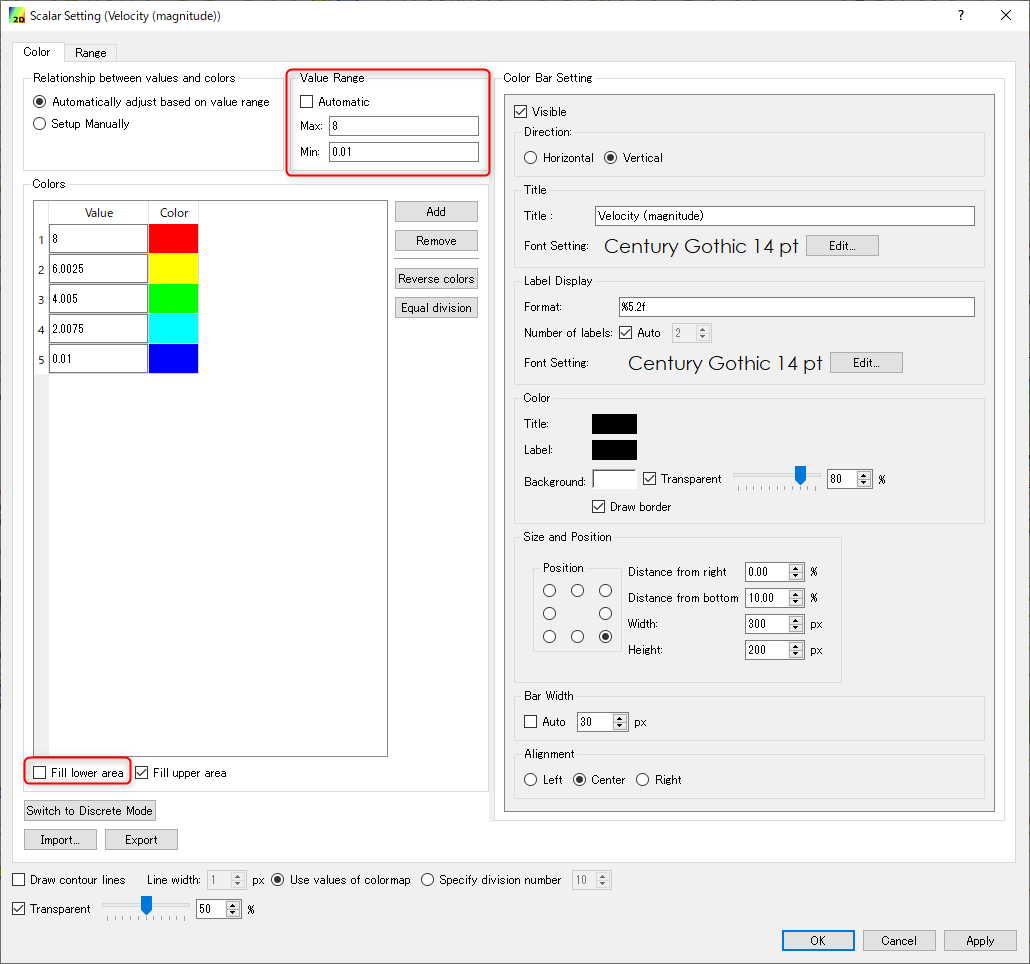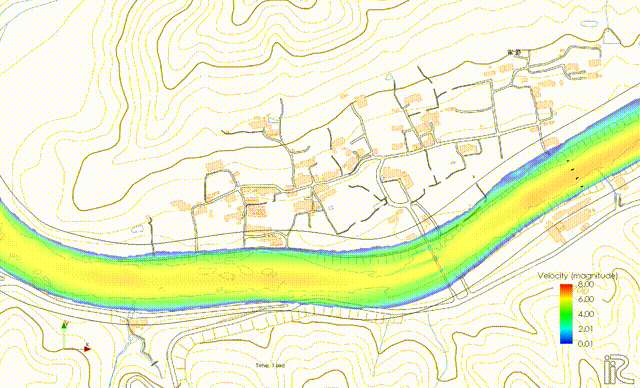[Example 3] Tracer Tracking Simulation in Real River
In this section, we perform s simulation of tracking floats for the discharge measurements in a real river. Floats are injected from a bridge and velocities are calculated by measuring the flow time between two sections ste up with 100m interval in which the upper section is located 130m downstream of the bridge. Using a discharge of 384m \(^3\)/s, flow calculation is conducted using Nays2d+, and the paths of the floats are simulated by GELATO.
Flow Calculation by Nays2d+
Selection of Solver
From the start window of the iRIC, launch [Nays2d+] as Figure 167.

Figure 167 : Solver Selection
Import Geometric Data and Making Computational Grid
Importing River Bed Elevation Data
From the main menu, select [Import]->[Geographic Data]->[Bed Elevation(m)] as Figure 168, and read “tikei.tpo (Point Claud Data)” as shown in Figure 169.

Figure 168 : Import River Bed Data File

Figure 169 : Selecting a tpo file
While reading the data, you need to set filtering value as Figure 170. In this example, choose [1] just for without filtering.

Figure 170 : Input Filtering Value
The geometric data (ground elevation data) is shown as Figure 171.

Figure 171 : Geometric Data
Setup Background image
From the main menu, select [File]->[Property], and press [Edit] button at [Coordinate System:] information as Figure 172.

Figure 172 : Project Property
in the [Select Coordinate System] window, type “Japan” at [Search:] box, and select [EPSG ….. Japan …. IV] from the list below the [Search:] box, and press [OK] as Figure 173. Then close the [Project Property] window by pressing [Close].

Figure 173 : Select Coordinate System
In the [Object Browser], put check marks at [Background Images (Internet)] ->[国土地理院(標準地図)] as Figure 174.

Figure 174 :Select Background Image
Grid Creation
From the main menu, select [Grid]->[Select Algorithm to Create Grid], and select [Create grid from polygonal line and width] in the next window (Figure 175)

Figure 175 : Select Grid Creating Algorithm
Assign channel center points from the upstream side to down stream side as Figure 176. 上流側から下流へ向けて中心位置を選択する.

Figure 176 : Assign Center Points
In the [Grid Creation] window, Figure 177, input values as Ni=200, Nj=60 and W=120, then the grid size becomes about 3.2mx2m as Figure 178.

Figure 177 : Grid Creation

Figure 178 : Created Grid Shape
Setup for Bridge Piers
From the [Object Browser] in the left side of the window, hide the [Point Cloud Data 1] by removing the check mark. Right click [Obstacles], select [Add]->[Polygons], and make polygons by clicking the outer edge of the piers, and assign them as [Obstacle] (Figure 179) Surround all the cells in one polygon and assign it as [Normal Cell]. Note that the [Normal Cell] polygon has to be located at lower layer than the [Obstacle] polygons (Figure 180).

Figure 179 :Obstacle Cells for Bridge Piers

Figure 180 :Normal Cells for All the Area
Set Manning’s Roughness Coefficient
[マニングの粗度係数]よりポリゴンから全格子囲みn=0.030を入力する.
In the [Object Browser] under the group of [Geographic Data], right click [Manning’s roughness coefficient] and select [Add]->[Polygons], and make a polygon covering all the grid domain, and input n=0.030 (Figure 181).

Figure 181 :Set Manning’s Roughness Coefficient
Attributes Mapping
From the main menu, select [Grid]->[Attributes Mapping]->[Execute] (Figure 182).

Figure 182 :Select Attributes Mapping
Put check marks at [Elevation(m)], [Obstacle] and [Maninng’s roughness coefficient] in the [Attribute Mapping] window as Figure 183, and press [OK] to execute mapping.

Figure 183 :Choose Mapping Items and Execute Mapping
Set Calculation Condition
From the main menu, select [calculation Condition]->[Setting], and input parameters in the [Calculation Condition] window as the following figures of Figure 184, Figure 185, Figure 186, Figure 187, Figure 188 and Figure 189. When you finished to input parameters, press [Save and Close].

Figure 184 :Discharge and downstream water surface elevation settings

Figure 185 :Time series of discharge and downstream stage

Figure 186 :Time and bed erosion parameters

Figure 187 :Boundary Condition

Figure 188 :Other computational condition

Figure 189 :3D Velocity Profile
Execute a Solver
Save the project with some name, and run the solver by [Simulation]->[Run]. When the simulation finished, save the results and close the project.
Tracking Virtual Tracers by GELATO
Select a Solver
In the [Select Solver] window, which appears when you select [Create New Project] in the startup window of the iRIC, select [GELATO] and press [OK] as Figure 190.

Figure 190 :Select GELATO Solve
Import Grid Data
Right click [Grid(No Data)] in the [Object Browser] and select [Import] as Figure 191.

Figure 191 :Select GELATO
Choose [Case1.cgn] which contains the calculation results of [Nays2d+] saved in the previous section (Figure 192)

Figure 192 : Select a File to Import
Confirmation of Geographic Data
Set coordinate system by selecting [File]->[Property] from the main menu as Figure 193.

Figure 193 :Select Property
In the [Project Property] window, press [Edit] located at the [Coordinate System:] lin (Figure 194)

Figure 194 :Project Property
Type “Japan” in the box next to [Search:], select a line with [ EPSG:…Japan….CS VI], and press [OK] as Figure 195.

Figure 195 :Select Coordinate System
Select [Background Images(Internet)]->[国土地理院(標準地図)] from the Object Browser as Figure 196.

Figure 196 :Background Image
Tracer Tracking by GELATO
Calculation Condition
From the main menu, select [Calculation Condition]->[Setting], and set the [Calculation Condition] as Figure 197, Figure 198, Figure 199 and Figure 200. In which the CGNS file to read in the Figure 198 is usually the same file imported for calculation grid in Figure 192.

Figure 197 :[Basic Settings]

Figure 198 :Set the CGNS file to read the flow field information

Figure 199 :Set special tracer information for path tracking

Figure 200 :Diffusion Condition
Execute Calculation
From the main menu, save thr project by selecting [File]->[Save Project as], and execute GELATO by selecting [Simulation]->[Run].
Visualization of the Calculation Results
From the main menu, select [Calculation Result]->[Open new 2D Post-Processing Window]. Put check marks in [Background Images(Internet)] and [GSI(Ortho Images)(Japan only)] in the Object Browser, as Figure 201.

Figure 201 :Show Background Image
Right click the [Trajectory] at the [Polygon] in the Object Browser, and select [Property] as Figure 202.

Figure 202 :Property of the Polygon
In the [Polygon Setting] window, set [Line Width] as [3] as Figure 203.

Figure 203 :Polygon Setting
From the Object Browser, put check marks at [Scalar(node)] and [Velocity] and right click [Velocity] and press [Property]. In the [Scalar Setting] window, as shown Figure 204, uncheck [Automatic], set [Max:] and [Min:] vales, and uncheck [Fill lower area].

Figure 204 :Scalar Setting
After above settings the calculation results of the tracers injected from the Bridge can be visualized as follows.

Figure 205 :Tracer Tracking Paths

Figure 206 : Tracer Tracking Animation